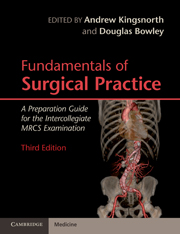Book contents
- Frontmatter
- Contents
- List of contributors
- Preface
- Section 1 Basic Sciences Relevant to Surgical Practice
- Section 2 Basic Surgical Skills
- Section 3 The Assessment and Management of the Surgical Patient
- Section 4 Perioperative Care of the Surgical Patient
- 11 Fundamentals of intestinal failure and nutrition
- 12 Enhanced recovery after surgery
- 13 Fundamentals of intensive care
- 14 Caring for surgical patients: complications and communication
- 15 Management of sepsis
- Section 5 Common Surgical Conditions
- Index
- References
12 - Enhanced recovery after surgery
Published online by Cambridge University Press: 03 May 2011
- Frontmatter
- Contents
- List of contributors
- Preface
- Section 1 Basic Sciences Relevant to Surgical Practice
- Section 2 Basic Surgical Skills
- Section 3 The Assessment and Management of the Surgical Patient
- Section 4 Perioperative Care of the Surgical Patient
- 11 Fundamentals of intestinal failure and nutrition
- 12 Enhanced recovery after surgery
- 13 Fundamentals of intensive care
- 14 Caring for surgical patients: complications and communication
- 15 Management of sepsis
- Section 5 Common Surgical Conditions
- Index
- References
Summary
Introduction
History of gastrointestinal surgery
Gastrointestinal surgery in one form or another has been described since the writings of Hippocrates in the fourth century BC. By the twelfth century AD, the seminal work Regimen Sanitatis Salerni was published by the School of Salerno and became one of the most influential medical texts ever produced. In it, Roger Frugardi (also known as Roger of Salerno) described suturing wounds of the intestine and laid out rules of hygiene. In the early 1890s, Maunsell described the preoperative preparation of patients by washing out the stomach and rectum, and this principle of mechanical bowel cleansing has been widely followed to this day. However, the art and science of surgery are constantly evolving and many doctrines that were rigorously adhered to in the past have not stood the tests of time and scientific evaluation. Even Hippocrates' teachings have not been immune to subsequent correction; in his ‘Apology and Treatise’, the sixteenth-century French surgeon Ambroise Paré argues against Hippocratic treatment of volvulus.
‘Moreover, I should be sorry to follow the saying of the sayd Hippocrates, in the third booke, De Morbis, who commands in the disease called Volvulus to cause the belly to bee blowne with a pair of Bellowes, putting the nosell of them into the intestinum rectum, and then blow there till the belly be much stretcht, afterwards to give an emollient glister, and to stop the fundament with a sponge. Such practise as this is not made now a dayes therefore wonder not if I have not spoken of it.’
- Type
- Chapter
- Information
- Fundamentals of Surgical PracticeA Preparation Guide for the Intercollegiate MRCS Examination, pp. 181 - 189Publisher: Cambridge University PressPrint publication year: 2011



